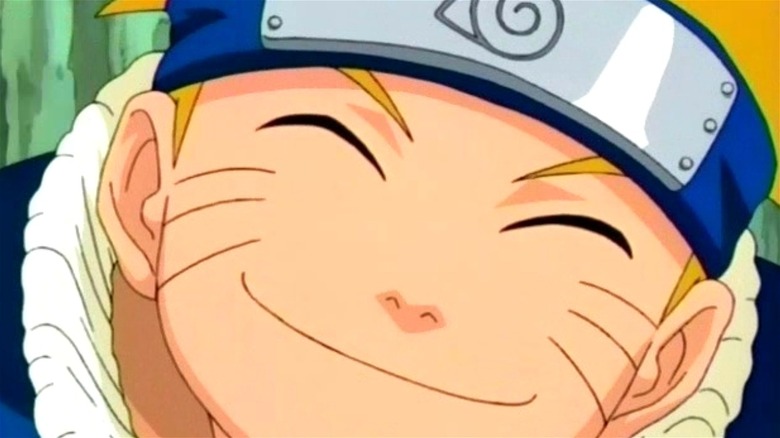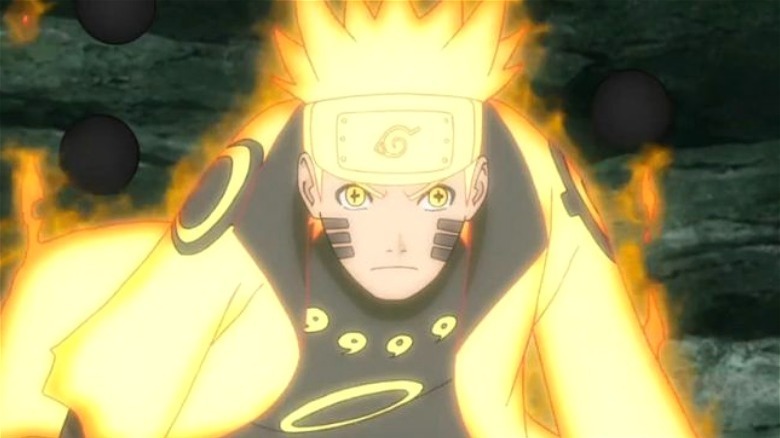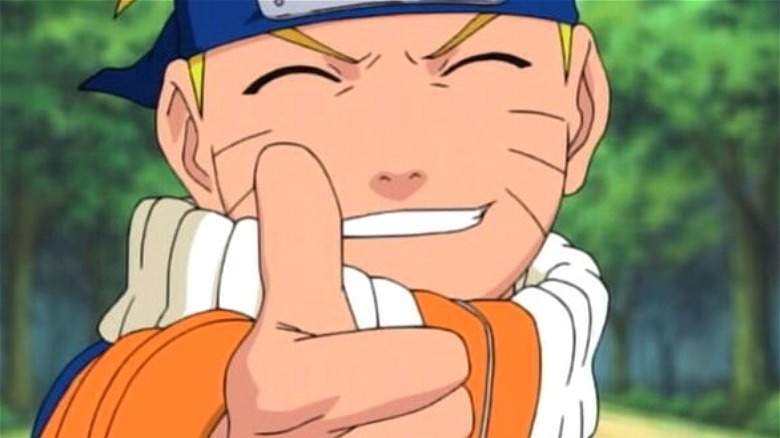There's A Nugget Of Naruto's Creator In Its Titular Character
In Masashi Kishimoto's manga series, "Naruto," the titular hero wears a bright orange jumpsuit, which is the opposite of what a stealthy ninja would wear. Instead of lurking in the shadows, Naruto Uzumaki announces his presence to his enemies and unabashedly boasts about his skills. After being bested in battle, Naruto is doubly determined to train harder and does not stop until he claims victory. This unwavering optimism is why Naruto grows up to be a skilled, formidable ninja who eventually becomes the Hokage of the Hidden Leaf Village.
Although Kishimoto's characters in "Naruto" are original creations, the manga-ka based some of the titular ninja's traits on his own childhood experiences. In an interview with Los Angeles Times, Kishimoto explained that Naruto was "created based on [the] self-image of [his] own childhood," as he was "a poor student" who "gave up easily." Similar to Kishimoto's experience as a student, Naruto constantly failed classes at the Ninja Academy and never took his lessons seriously. However, the key difference that Kishimoto established was the character's unending optimism which helped him evolve into a responsible adult.
The similarities between Naruto and Kishimoto's childhood traits do not end here. Shonen Jump sat down with Kishimoto in 2006 and asked him about the process of creating a protagonist who was an underdog and perceived as an outsider. In this interview, Kishimoto went into the details of his own childhood, explaining how the loneliness he felt as a kid translated into Naruto's heartbreaking backstory as a shunned, feared child in the Hidden Leaf Village.
The underdog is always worth rooting for
When Kishimoto first drew "Naruto" as a one-shot manga in 1997, he painted the protagonist as a rowdy troublemaker uninterested in going to school. However, after the one-shot was translated into a weekly manga series in 1999, Kishimoto added pathos and depth to Naruto's childhood. While Naruto was still a knuckleheaded brat, he now had the spirit of the Nine-Tailed Fox sealed inside him, which prompted the village to shun him completely. Growing up an orphan, Naruto spent most of his time pulling pranks and destroying village property in an attempt to get the love/attention he desperately craved.
In the Shonen Jump interview (via NarutoHQ) mentioned above, Kishimoto talked about how his childhood "wasn't all that happy" and how he often felt like an outsider in school, which is reflected in Naruto's story:
"My childhood wasn't all that happy...Like any person, I've had hardships in my life. I was not the center of anyone's attention in school, rather sitting on the outskirts. I didn't do well in everything. I didn't excel in studies or sports. So I can understand Naruto's feelings about being an underdog."
Naruto emerges as the ultimate underdog, which is perhaps one of the reasons why fans of the manga/anime find him so relatable and inspiring. Even after being mocked by his peers and elders, Naruto vows to try harder, managing to graduate from the Academy after three tries. During his missions with mentor Kakashi, he is not as skilled as Sasuke or as quick-witted as Sakura. Nevertheless, Naruto introduces an element of unpredictability during missions, as he never backs down from protecting his team or laying his life on the line.
When life imitates art
In a 2017 interview at New York Comic-Con (via Anime News Network), Kishimoto said that he got a string of rejections while attempting to create a hit shonen manga series before "Naruto." When asked about his attitude towards rejection and whether he felt discouraged at any point, Kishimoto said the following:
"I don't know if I ever really got THAT discouraged or depressed during that time! I always had the thought in the back of my head, 'Eh, so they rejected me this time, I know I'm going to be a mangaka someday. That's all right, I'm just going to move on.' Partly because I thought that was the only thing I had to market myself. Maybe that makes me a little naïve or stupid."
Funnily enough, this is exactly how Naruto behaves when several characters tell him he can never become Hokage. Translator Mori Morimoto, who was present during the interview, quipped that Kishimoto's answer was "very Naruto-like," to which the manga-ka agreed. The similarities between this aspect of Kishimoto and Naruto's attitude towards rejection poses an interesting life versus art dynamic.
Just like Kishimoto, Naruto never gave up on his dreams. Intensely committed to his goals, Naruto rose up the ranks of shinobi and became the person he wanted to be. So did Kishimoto, as he helped create a vibrant, dynamic anime franchise adored by millions worldwide, becoming a beloved manga-ka in the process. Hopefully, the tale of Naruto Uzumaki will be a source of strength and comfort for the generations to come.


